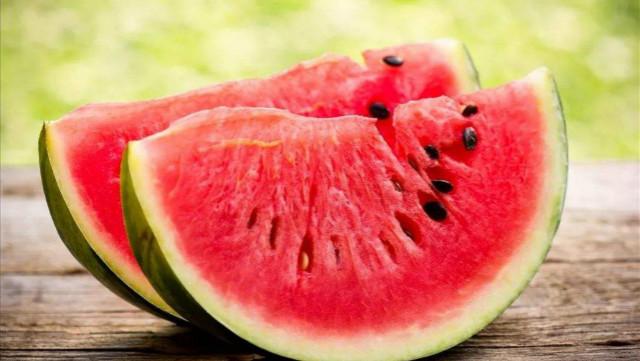
Wen | King Wu Jun
Watermelon is a good product for cooling the heat in summer, cool and sweet, refreshing and refreshing, and is deeply loved by people.
Regarding watermelon, the literati and inkers of the past generations have raised their pens to chant for it, leaving many anecdotes and good stories, which are quite interesting.
According to historical records, the earliest watermelon poems appeared in the Song Dynasty. At that time, there was a poet named Fang Huiqiu, who once wrote in the poem: "Watermelon quenches thirst and cuts the skin of Qingyao." This is the earliest known verse about watermelon, so Fang Huiqiu became the first person in Chinese history to write a poem for watermelon.
The Song Dynasty poet Fan Chengda also wielded pen and ink and gladly wrote poems for watermelons: "Bi Man Ling Frost lies in soft sand, and eats watermelon everywhere for many years." The poem is fresh and natural, describing the poet's pleasure when tasting watermelon, which can be called a good sentence in watermelon poetry. Reading this poem, it is as if you have seen the large turquoise watermelon lying on the soft sand, as if you feel the wonderful taste of the sweet and refreshing watermelon.
The Yuan Dynasty poet Fang Kui was even more fond of watermelons, and he wrote happily in a poem entitled "Eating Watermelon": "The wisps of flower shirts are stained with green saliva, and the traces of Dan blood are red." Fragrant and smiling teeth aquatic, cool into the placket bone wind. "The language of the whole poem is vivid and vivid, the image is natural, and it vividly describes the natural characteristics of watermelon sweetness, coolness, freshness and fragrance.
Su Dongpo, a great scholar of the Song Dynasty, liked to eat watermelon all his life, and in his mind, watermelon was "ice pulp fairy liquid". It is said that Su Dongpo once wrote such a couplet related to watermelon: "Sit south and eat watermelon, and the skin is thrown to the east; before thinking about it, looking at the "Left Transmission", the book is turned to the right." This couplet is humorous and funny, vividly describing the author's free mood of eating watermelon, although the language is simple, but quite interesting.
During the Ming Dynasty, there was a talented man named Jiang Tao. Once, several guests came to visit. At that time, it was a hot summer, and Jiang Tao took out a large watermelon to entertain everyone. Just when everyone was about to pick up the watermelon and eat it, suddenly a guest said: "Eating watermelon in the summer, how can you not have words to help you?" Well, I'll make an uplink and see who can play the downlink. ”
So, the guest pondered a little and said: "Freezing rain sprinkles the window, two o'clock in the east and three o'clock in the west." His upper link uses the form of the "split grid" in the couplet, splitting the frozen word into "east" characters plus two points, and splitting the "sprinkle" word into western characters plus three points, which is very clever.
His Shanglian had just spoken out, and Jiang Tao, who was standing by, continued: "Cut and divide the guests, seven knives on the top, eight knives on the bottom." ”
Jiang Tao also used the character splitting grid, he split the word "cut" into the word "seven" and "knife", and the word "split" into the word "eight" and "knife", and it was very consistent with the scene of eating watermelon. Therefore, as soon as his voice fell, he won the praise of the crowd.